penetration
Modelling Social Mechanisms for Knowledge Generation & Exploration
Nanda Wijermans, Stockholm Resilience Centre Human behaviour is a complex phenomenon with a lot of open questions. Computational modelling can support the scientific quest for more understanding of hum
Inherited Trust and the Economic Success of Second Generation Immigrants
Martin Ljunge, Institutet för Näringslivsforskning (IFN) ABSTRACTThe paper that will be presented finds significant private returns from trust. Individuals with high trust earn more. Greater trust lead
Frank Kalter: The structural integration of the 2nd generation in Germany. New data, same old stories?
Frank Kalter, Professor of Sociology at the Faculty of Social Sciences, University of Mannheim ABSTRACT Occupational and educational attainment are widely seen as the key to the integration of immigrant
POSTPONED. NEW DATE PENDING.Nicole J. Hassoun: Aiding the Poor in Present and Future Generation
Postponed. New date pending. Nicole J.Hassoun, Professor, Department of Philosophy, Binghamton University.Abstract This paper discusses and brings together two lines of research on global justice – one

A lost generation? A study of long-term influence of the COVID-19 pandemic on business students and their career networks
What impact did the pandemic have on business students' social networks, and how will it impact their career possibilities?
Global variations in online privacy concerns across 57 countries
Computers in Human Behavior Reports, vol 9 Abstract Cross-cultural studies have found national differences in how concerned people are about online privacy. However, it has not yet been settled what cau

Kremlin influence and the destabilization of Swedish democracy
An analysis of geostrategic market offensives, Russian influence operations, Swedish partners, and the threat of oligarchic capitalism
Discrimination and Future Generations
In: Mosquera, J. & O. Torpman (ed.),Studies on Climate Ethics and Future Generations vol. 6. Working Paper Series 2024:10–17 Abstract In this paper, I analyse whether the present generation’s choices. This has been tentatively suggested in both legal theory and philosophy; I review such suggestions briefly in section 1. However, a more rigorous analysis – outlining the concept, relevant grounds, and wrong-making features of discrimination, and applying these to future generations – is still lacking. To address this lacuna, I propose a theory of discrimination and analyse why it might seem to apply – yet ultimately fails to apply – to the differential treatment of future generations. More specifically, I propose a definition of discrimination (section 2.1) and an account of the moral wrongness of discrimination (section 2.2). I moreover explore the connection between discrimination and theories of social (in)justice (section 2.3). I then apply this theory to the problem of differential treatment of future generations. While discrimination may occur between collectives, such as generations (section 3.1), my analysis shows that the specific temporal status of future generations is not comparable to other grounds of discrimination, such as gender or race (section 3.2). Moreover, due the non-identity problem and the problem of lack of a “community of social meaning” between generations, future generations cannot be claimed to be subjected to worse treatment by the present generation (section 3.3). Hence, their differential treatment due to the present generation’s choices does not amount to discrimination. Section 4 concludes and outlines some upshots of my analysis.

Future generations
Climate change is the biggest challenge of our time, and in this theme there is a focus on future generations and their living conditions. We aim to examine among other things climate ethics, sustainable development, green growth, obstacles to climate action and social dilemmas.

A welfare state for all generations
In a society there are always several generations co-existing and they all need different things from the welfare state. This result is a conflict between generations on who should be favored by publi by , Tommy Ferrarini, Kenneth Nelson and Joakim Palme.








